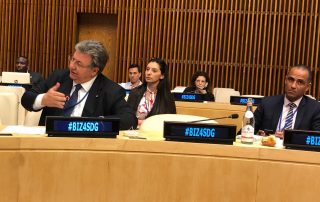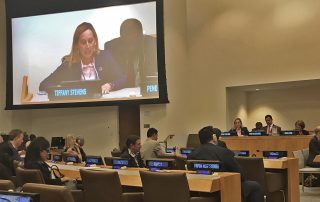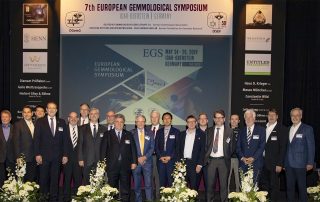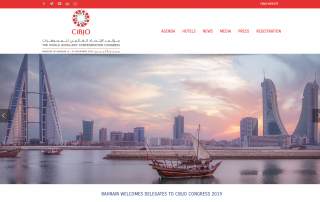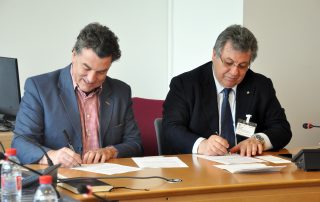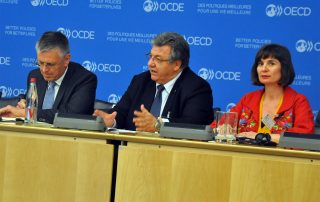CIBJO President advocates case for small business enterprises during UN’s High-Level Political Forum on Sustainable Development
ABOVE: CIBJO President Gaetano Cavalieri (left) addressing the World Business Council for Sustainable Development (WBCSD), during the 2019 High-Level Political Forum on Sustainable Development at the United Nations in New York on July 17.
JULY 18, 2019
Speaking at a meeting of the World Business Council for Sustainable Development (WBCSD), which took place during the United Nation’s 2019 High-Level Political Forum on Sustainable Development in New York, CIBJO President Gaetano Cavalieri has advocated for the position of small and medium-sized enterprises. Sustainable economies rely on the contribution of SMEs, he said, but too often they find themselves operating at a severe disadvantage when compared to larger companies.
The High-level Political Forum on Sustainable Development (HLPF), which currently is underway at UN headquarters in New York, is the international body’s main platform for monitoring follow-up on the actions of states and other actors towards the Sustainable Development Goals (SDGs).

Members of the panel during the World Business Council for Sustainable Development (WBCSD) session at the United Nations on July 17, 2019, listening to the intervention by CIBJO President Gaetano Cavalieri.
One of the challenges we have faced in raising the positive developmental impact of SMEs in the jewellery and gemstone business is that, frequently, the due-diligence and financial requirements necessary to demonstrate that they comply with responsible business practices place them at a significant disadvantage,” Dr. Cavalieri said. “In the jewellery business this is particularly ironic because, although turnover is dominated by a relatively small number of large corporations and brands, employment and company ownership are overwhelmingly vested with SMEs, most of which are family owned.”
Echoing the 2019 HLPF’s theme of “Empowering people, ensuring inclusiveness and equality,” the CIBJO President stressed that ways must be found to raise the involvement of all players in the business sector in capacity-building and sustainable development. Remaining inclusive, he said, means not disadvantaging SMEs.
Opening the HLPF session the day before, UN Secretary General António Guterres had said that the world’s people are demanding “transformative change that is fair and sustainable.”
“The evidence is clear,” the UN Secretary General stated, “development is not sustainable if it is not fair and inclusive – and rising inequality hinders long-term growth.”
CIBJO was attending the HLPF in its capacity as the international jewellery sector’s representative in the UN’s Economic and Social Council (ECOSOC), which is one of the six main organs of the United Nations and is the principal body for coordinating policy review, dialogue and recommendations on economic, social and environmental issues, as well as for the implementation of the Sustainable Development Goals. CIBJO was awarded special consultative status in ECOSOC in 2006, and that same year joined the UN Global Compact, which the global network of sustainable companies and organisations that pledge to align their strategies and operations with basic principle on human rights, labour, environment and anti-corruption.

